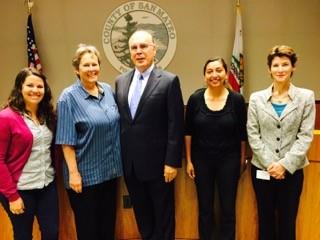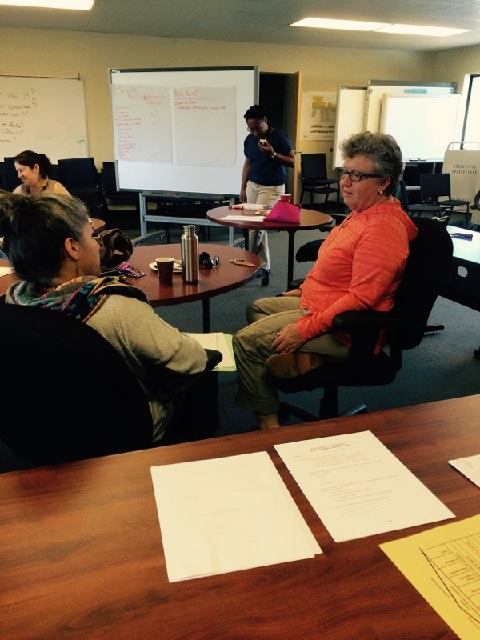When you struggle with health issues, sometimes it’s easier to talk to a friend you trust than to a doctor you don’t know. Someone who is approachable and speaks your language.
That’s the principle behind Puente’s new Community Health Workers / Promotoras de Salud Project, which recently secured funding to train and hire community members to visit farms, ranches, and all people in need on the South Coast. The Promotoras (three bilingual, two Spanish-only speakers) will talk to people about their health – and discuss the importance of preventive services and seeing a doctor regularly. They will play a key role in helping funnel more local patients into the recently opened health clinic housed in Puente’s offices.
“The Promotoras don’t have as much medical knowledge, but they do have community knowledge. They will act as the bridge between the community and the medical clinic,” says Molly Wolfes, Community Health Coordinator for Puente.
Puente’s pop-up medical clinic, a satellite of San Mateo Medical Center’s Coastside Clinic in Half Moon Bay, opened in March. Since then, the county doctors who staff the clinic have seen 99 patients. Nearly 80 percent are low-income farm workers and their families.
The clinic represents the latest attempt to address the serious lack of health services available to several under-served and under-insured communities on the South Coast. As many as 500 individuals do not have regular access to a physician, a dentist or an eye doctor. For everything from check-ups to pediatrics and OBGYN, help is as much as an hour away. Not only do some farm workers lack cars in a place where public transportation is almost non-existent, they have trouble making it to appointments. Doctors’ office hours don’t exactly correspond to their intensely long work shifts, and many farmers live day-to-day on the money they make. Taking the day off to see the doctor could mean no money for food.
The result is that 40 percent of adults have not seen a doctor in the past year, according to a recent community health care survey Puente conducted.
“Especially within the Latino community and couch surfing/mobile communities in La Honda that have struggled to access care, there is a perception that barriers exist preventing them from getting care. Some of the perceived barriers may include fear, a language barrier, or transportation and child care issues,” says Wolfes.
That will change now, thanks to a plan conceived by Puente health advocates with support from San Mateo County Health System. In early August, Supervisor Don Horsley and the other members of the Board of Supervisors voted to approve Measure A funding for the Community Health Worker/Promotora program totaling $351,235 over two years.

Big day on the South Coast — The San Mateo County Board of Supervisors voted unanimously yesterday to fund Puente’s first community health worker/promotora program.
from left to right: Molly Wolfes, Kerry Lobel, Supervisor Don Horsley, Rita Mancera, and Dr. Susan Ehrlich, Chief Executive Officer at San Mateo Medical Center.
The funding will train several community members, including some Puente staff, as Community Health Workers/Promotoras. Bringing new people into the clinic requires active outreach, face-to-face conversations, and an understanding of what’s needed to connect patients to doctors.
If someone lacks health insurance, Promotoras can help make an appointment with a Puente Resource Navigator. If a Health Promotora notices signs of depression, they can make a referral to Puente’s mental health services. If a nurse’s attention is called for, the client can be referred to Karen Hackett, a San Mateo County Public Health nurse headquartered with Puente.
Puente also arranges free transportation to and from any medical or dental appointment for local participants who need it.
The county has already committed funds to help Puente and the Medical Center split the existing exam room—making two exam rooms in one of its portables. The program could grow from there. In the first year of the Promotoras grant, Puente will need to touch at least 100 new participants every month.
“If this actually works – and I think it will – the numbers will look really good, and that will justify getting a second portable to perhaps expand the clinic,” says Supervisor Horsley. “I’m excited to see this partnership between the County, Puente, and the Medical Center – we’re truly building something from the ground up in Pescadero.”
The starting point is setting up a once-yearly physical for local residents, with a focus on preventing serious medical conditions before they start.
“Quite a few of our patients have never been to a doctor. I realize that’s odd because they’re middle aged, but they’re from rural areas and they’ve never sought medical care,” says Jonathan Mesinger, Clinics Manager for both Half Moon Bay and Pescadero.
Puente Executive Director Kerry Lobel describes the habit of self-care as a kind of “muscle memory” that Puente hopes to induce. To that end, Promotoras will also lead formal weekly health support classes for those who suffer from chronic diseases, such as diabetes, to teach patients and their family members the best prevention techniques as well as strategies for care. Later on, the classes will expand to smaller groups at the ranches themselves.
Health Promotoras are not only from the community they serve, they will be taking control of its future. This kind of self-advocacy approach to change – from the inside – is part of Puente’s continuing initiative in building community leadership.

Karen Hackett, right, talks with Sandra, one of the new Promotoras.
Take La Sala, Puente’s twice weekly social space for farm workers: a former participant is now part of the staff that helps run the program. Women from Pescadero and La Honda lead Puente’s Zumba classes. And local parents, who are trained as facilitators, teach Puente’s Abriendo Puertas sessions on early childhood education and development.
“It’s a well-established principle here that peer leaders are the way to go. We knew that was the best way to approach health prevention activities,” says Lobel.
Puente’s Health Fair is another ongoing strategy that targets health prevention in particular. The second annual Health Fair on October 4 will have a family focus, with free flu vaccines and multiple health screenings available for all ages, and a bike rodeo, a drawing, and fun kids’ activities. The message: seeing a doctor doesn’t have to be a scary ordeal, so let’s get it all done in one day.
Health care has always been a front-burner issue in Pescadero. The Pescadero clinic is the latest iteration in the search for a medical home on the South Coast that goes back more than 30 years. As early as the 1970s, community leaders established a clinic inside a local school, and later, in Pescadero Community Church. The South Coast Collaborative and North Street Community Resource Center worked hard to get doctors to the area before Puente came along. The county thrice funded a mobile health van staffed with doctors and nurses, but it was discontinued when money ran out.
In 2014, the county set aside $1 million to outfit a new medical van but then withdrew the plan. Without a van, the bricks and mortar clinic requires Health Promotoras to conduct outreach. It may not be perfect solution, but it’s the closest the community has come in a while.
“It’s been filled with pain and gain for so many years now,” says Lobel. Three years ago, Puente renewed its health strategy with major assistance from the Lucille Packard Children’s Hospital Stanford in the form of a multi-year grant as well as grants from Kaiser Permanente, Mills Peninsula Health Services/Palo Alto Medical Foundation, and the Gordon and Betty Moore Foundation.
“Today’s approach to healthcare is a result of a deep partnership between Puente and Supervisor Don Horsley,” says Lobel.
In October 2012, Supervisor Horsley promised that if Measure A passed, funding would be used to bring medical care to Pescadero. Horsley was true to his word, first exploring the concept of a mobile van, and then leveraging a partnership with the San Mateo Medical Center to bring a medical team to Pescadero on a weekly basis. He secured Measure A funding to remodel office space at Puente for two exam rooms, and for the Community Health Worker/Promotoras Project.
According to Lobel, “100 local residents have received healthcare, to date, because of Horsley’s efforts – that’s a huge accomplishment.”
Puente is now pushing for pediatric care where possible. And according to Mesinger, the county might add a pediatrician to their Pescadero clinic if the numbers warrant it. This year, for the first time ever, Puente arranged for a Coastside Clinic pediatrician to come during backpack distribution day. Nine children were able to get their physicals and be ready to go back to school.
The Promotora model originates in Mexico, and it has been used in other contexts with success in the U.S. Here in San Mateo County, the Sheriff’s Office used home visits and community workshops in North Fair Oaks as a way to educate parents about the warning signs of drug use and gang affiliation among young people.
Mesinger himself was manager of the Fair Oaks Health Clinic in Redwood City for many years, and clinic patients were 85 percent Latino, demographically similar to clinic patients on the South Coast. Most spoke Spanish only. Mesinger says the experience taught him that patients need to become comfortable with their doctors over time, and that those long-term relationships take time to build. Mesinger says county staff is looking forward to building those relationships in Pescadero.
“The key is, how much are you a part of the community that you’re serving?” says Mesinger. “The community knows Puente, and that’s a big advantage. It really helps to be associated with Puente.”
Join Puente for its second annual community Health Fair on Sunday, October 4 from 11 a.m. to 3 p.m. at 620 North Street in Pescadero. Come for a health screening and Medicare counseling, stay for the raffle and kids’ activities. For details, visit www.mypuente.org.




